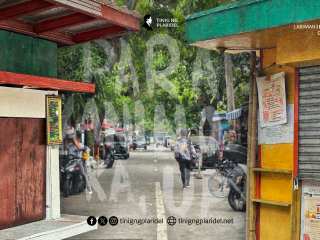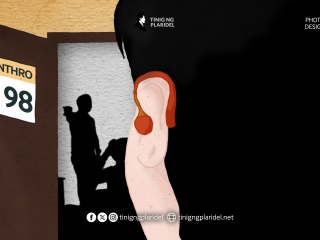Some wounds never heal.
For Dulaang UP’s one-act play “The Reconciliation Dinner”, the wounds left by the 2022 elections are here to stay.
This could not be more apparent between Dina, Bert and Mica Medina (Stella Cañete-Mendoza, Rody Medel Villarama and Harriette Mozelle, respectively) who are fervent supporters of Ferdinand Marcos Jr. and Susan, Fred and Norby Valderama (Frances Makil-Ignacio, Jojo Cayabyab and Phi Palmos, respectively) who tirelessly campaigned for Leni Robredo in the presidential race.
It has been over six months since one of the country’s most polarizing elections and the families are ready to put the past behind them and start moving on. Or so they thought.
As what would be painfully revealed by the characters’ bitter arguments, heated exchanges and even physical threats, the choices that people make — political or not — cannot be simply brushed aside.
Dinner is served
“The Reconciliation Dinner” is the latest collaboration between playwright Floy Quintos and director Dexter Santos. The duo previously worked on Quintos’ swan song “The Kundiman Party”, first staged in 2018 and whose success led to a restaging in 2019.
“The Reconciliation Dinner” featured an appetizing spread of Quintos’ signature wit, bold political commentary and incredibly human introspections. Like “Kundiman”, it is a strong ensemble piece thanks to a host of powerhouse actors.
Cañete-Mendoza and Makil-Ignacio, both Kundiman alums, returned onstage in their respective roles as blithe and blasé Dina and tender but indignant Susan.
The two female leads shone in their roles, carrying much of the play’s emotional gravitas as two best friends pulled apart by their strong political beliefs. Although both delivered compelling inner monologues — often against each other — it is in their quieter moments that Cañete-Mendoza and Makil-Ignacio shone the brightest.
Meanwhile, Villarama plays the role of an alpha male to a T as Duterte fanatic Bert while Mozelle embodies the perfect bitchiness worthy of the “gaslight, gatekeep, girl boss” trope.
Cayabyab as Fred is just fine – perhaps a function of a relatively lackluster role compared to the other characters’ vibrant personalities.
Palmos’ performance, although strong from beginning to end, suffered from a character predisposed to comic relief. Norby is your typical bakla who is inexplicably infatuated with Mica’s husband Ely (Red Atadero). Some of Palmos’ jokes did not land and some lines were obviously written specifically to show off Palmos’ singing prowess and — though admirable — often only felt forced.
Though not without its faults, The Reconciliation Dinner succeeded in its thrust to find the human in the political – lest it gets lost in the chorus of righteous indignation and moral outrage.
Just desserts
The political rivalry between Marcos and Robredo and how this trickles down to their supporters is the central theme of the play.
This was demonstrated through projection-mapped tirades, first in the characters’ online reactions to the news and later in their attacks against each other on social media.
The Medinas are what you would expect from Duterte-slash-Marcos supporters, but they are not your typical caricatures.
The Medinas are well-off. They are not victims of disinformation. They do not believe in the Tallano Gold. They know that fake news exists. But why do they support the Marcoses? Because they are tired of the political elite and their holier-than-thou supporters.
This is a wise characterization choice for Quintos as it saves him the trouble of assuming what the common Filipino sees in the Marcoses’ return to power. It allowed audiences to delve deeper into the individual psyche behind choosing what they think is the ‘lesser evil.’
Bert projects his insecurities and inferiority complex into rage and aggression directed at the people he assumes think lowly of him. Meanwhile, Mica adopts the internalized misogyny common to ‘powerful women’ who see masculine traits as the ultimate measure of strength. For Dina, the family lives a comfortable life despite political turmoil outside their home, so why bother?
On the opposite end is the Valderamas. They are your typical middle-class liberals. They detest the bastos and prefer decency in the government – think tight-lipped Mar Roxas over dirty-mouthed Duterte. They are peace-loving believers of democratic values and say no to violence – be it Duterte’s war on drugs or armed struggle. And in their words, “hindi sila nagra-rally.”
Their son, Norby, is a bit farther on the left of the political spectrum. They work as a drag queen who believes that drag is political. For them, political convictions require concrete actions. When their parents decided to migrate to Canada after Marcos’ win, Norby chose to stay. “Nandito ang laban,” they say.
And then there’s Ely, Mica’s agreeable husband who was secretly rooting for Robredo against his wife and in-laws’ wishes. He serves as the show’s voice of reason, tempering the extreme arguments of both families. For him, the Marcoses are morally corrupt but the following administrations are also at fault for being too forgiving. His opinion: the Marcoses should have been executed like the Romanovs of Russia.
When the tension between the families reached its precipice, they had to confront their differences and ask whether or not this is worth decades of friendship.
‘Who are you?’
After six years under Duterte’s divisive leadership, the stakes in the last elections were simply too high. It was either a continuation of the previous administration coupled with the restoration of a dictator’s family or an astounding victory for the broadest coalition of the opposition.
It is no surprise, then, that the campaign period brought out the best and worst in people. It was a time of moral ascendency, intellectual pride and strong political convictions – things that are difficult not to let spill over personal relationships.
“Pero hindi talaga eh,” Susan says in an internal monologue after being asked to change the topic in one of the couples’ early dinners. She just discovered that her best friend couldn’t care less about human rights violations. How does she move on from that?
There was also a moment in the play when Bert asks Norby why there are plenty of gays in Robredo’s rallies. It showed Ninong Bert’s shallow understanding of who Norby was as a person and rather sees them as a caricature of a certain group.
It is in these moments that people begin to question whether they really know the people they love the most and, corollary to that, what lines they are willing to cross for the people they love. Are personal relationships worth losing in the face of systemic problems? Does losing a good friend really make a difference in the greater scheme of things?
These are complex questions that can only be answered in the context of individual relationships and the play does not attempt to preach platitudes about them.
“The Reconciliation Dinner” asked some of the most difficult questions confronting Filipinos today. Like many great stories, it leaves it up to the audience to answer them.









